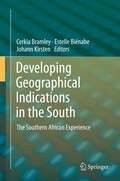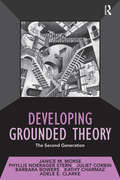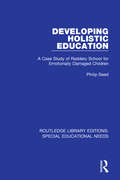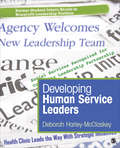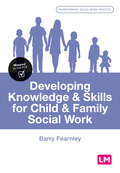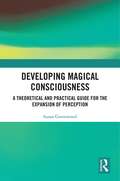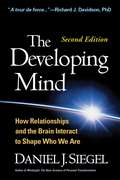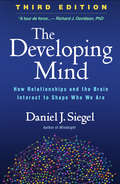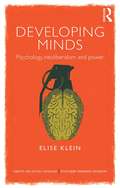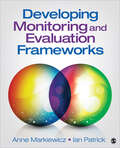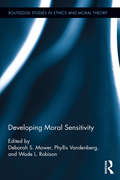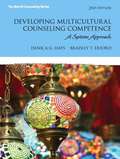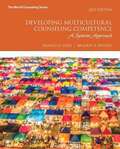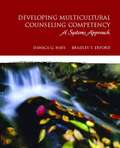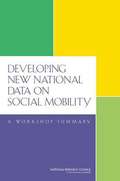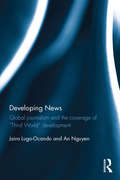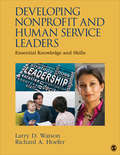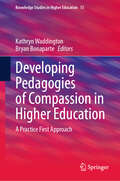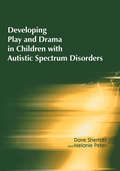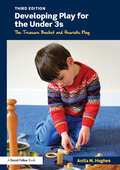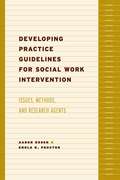- Table View
- List View
Developing Geographical Indications in the South: The Southern African Experience
by Cerkia Bramley Estelle Bienabe Johann KirstenThis book contributes to the literature on Geographical Indications (GIs) by providing key theoretical reflections from a five-year review process on the potential of GIs for agri-food products in Southern Africa. The contributors reflect on diverse GI processes and dynamics which operate at the local, national and international levels, thus enriching the understanding of GI dynamics and of the variety of policy options available for GI protection in Southern countries. Following a discussion of the legal framework and governance of national GI schemes in Southern countries, the book emphasizes the main dimensions underlying the development of GIs and their potential for enhancing sustainable rural development and market access in particular. This provides the structure for the chapters that build on the different experiences of Southern African industries that have embarked on GI strategies. The book includes chapters on designing an appropriate legal framework and governance system for the development of GIs in Southern countries.
Developing Grounded Theory: The Second Generation (Developing Qualitative Inquiry #3)
by Juliet Corbin Barbara Bowers Kathy Charmaz Adele E. Clarke Janice M. Morse Phyllis Noerager SternGrounded theory is the most popular genre of qualitative research used in the health professions and is widely used elsewhere in the research world. In this volume, six key grounded theory methodologists examine the history, principles, and practices of this method, highlighting areas in which different strands of the methods diverge. Chapters cover the work of Anselm Strauss, Barney Glaser, Leonard Schatzman, and the postmodern and constructivist schools. Dialogues between the participants sharpen the debate and show key topics of agreement and disagreement. This volume will be ideal for courses on grounded theory that wish to show the ways in which it can be used in research studies.
Developing Holistic Education: A Case Study of Raddery School for Emotionally Damaged Children (Routledge Library Editions: Special Educational Needs #47)
by Philip SeedFirst published in 1992. At one level, this book is about the care and education of children with very special needs. The needs result from emotional damage which impinges on their lives both at school and at home. At another level, it is about the development of a holistic approach to education – applicable to all children generally. The first part of the book describes the Raddery experience – a school set up in 1979 based on a holistic and therapeutic community approach to children with special needs. The second part of the book examines the implications of the Raddery experience for educational and child-care policy and practice at a time when there has been growing emphasis on integrating children with special needs into mainstream schools. Are the needs of the children at Raddery very different from others who have been successfully retained in normal classes? If Raddery, and schools like it, have a particular contribution, what is their secret? Can it be shared with ordinary schools?
Developing Human Service Leaders
by Deborah Harley-McClaskeyThis empowering text for human services students covers the skills and behaviors essential for leaders to manage themselves, their teams, and the organization. Using a unique coaching voice, the book follows a Reflection–Diagnosis–Prescription approach for leadership development with exercises built into the dialogue. The final chapter, Prognosis, offers a workbook-style exercise to help students make a personal change.
Developing Human Service Leaders
by Deborah Harley-McClaskeyThis empowering text for human services students covers the skills and behaviors essential for leaders to manage themselves, their teams, and the organization. Using a unique coaching voice, the book follows a Reflection–Diagnosis–Prescription approach for leadership development with exercises built into the dialogue. The final chapter, Prognosis, offers a workbook-style exercise to help students make a personal change.
Developing Knowledge and Skills for Child and Family Social Work (Transforming Social Work Practice Series)
by Barry FearnleyThis book will provide you with the initial developing knowledge and skills needed to practice ethically and effectively with children and families. It will take you on a journey, introducing you to all the relevant theory, legislation and skills for practice, using case studies, activities and research summaries to help you navigate the complexities and challenges along the way. Since launching in 2003, Transforming Social Work Practice has become the market-leading series for social work students. These books use activities and case studies to build critical thinking and reflection skills and will help social work students to develop good practice through learning. This best-selling student series is: · Affordable · Written to the Professional Capabilities Framework · Mapped to the social work curriculum · Practical with clear links between theory and practice
Developing Knowledge and Skills for Child and Family Social Work (Transforming Social Work Practice Series)
by Barry FearnleyThis book will provide you with the initial developing knowledge and skills needed to practice ethically and effectively with children and families. It will take you on a journey, introducing you to all the relevant theory, legislation and skills for practice, using case studies, activities and research summaries to help you navigate the complexities and challenges along the way. Since launching in 2003, Transforming Social Work Practice has become the market-leading series for social work students. These books use activities and case studies to build critical thinking and reflection skills and will help social work students to develop good practice through learning. This best-selling student series is: · Affordable · Written to the Professional Capabilities Framework · Mapped to the social work curriculum · Practical with clear links between theory and practice
Developing Magical Consciousness: A Theoretical and Practical Guide for the Expansion of Perception
by Susan GreenwoodOffering a new template for future exploration, Susan Greenwood examines and develops the notion that the experience of magic is a panhuman orientation of consciousness, a form of knowledge largely marginalized in Western societies. In this volume she aims to form a "bridge of communication" between indigenous magical or shamanic worldviews and rationalized Western cultures. She outlines an alternative mythological framework for the latter to help develop a magical perception, as well as giving practical case studies derived from her own research. The form of magic discussed here is not fantastic or virtual, but ecological and sensory. Magical knowledge infiltrates the body in its deepest levels of the subconscious, and unconscious, as well as conscious awareness; it is felt and understood through the connection with an inspirited world that includes the consciousness of other beings, including those of plant, animal and the physical environment. This is anthropology from the heart rather than the head, and it engages with the messy area of emotions, an embodiment of the senses, and struggles to find a common language of listening to one another across a void of differences. The aim is to provide a non-reductive structure for the creative interplay of both magical and analytical modes of thought. Passion is a motivator for change, and a change in attitude to magic as an integrative force of human understanding is the main thread of this work.
Developing Mind, Second Edition
by Daniel J. SiegelThis bestselling book put the field of interpersonal neurobiology on the map for many tens of thousands of readers. Daniel J. Siegel goes beyond the nature and nurture divisions that traditionally have constrained much of our thinking about development, exploring the role of interpersonal relationships in forging key connections in the brain. He presents a groundbreaking new way of thinking about the emergence of the human mind and the process by which each of us becomes a feeling, thinking, remembering individual. Illuminating how and why neurobiology matters, this book is essential reading for clinicians, educators, researchers, and students interested in promoting healthy development and resilience. New to This Edition Incorporates significant scientific and technical advances. Expanded discussions of cutting-edge topics, including neuroplasticity, epigenetics, mindfulness, and the neural correlates of consciousness. Epilogue on domains of integration--specific pathways to well-being and therapeutic change. Useful pedagogical features pull-outs, diagrams, and a glossary.
The Developing Mind, Third Edition: How Relationships and the Brain Interact to Shape Who We Are
by Daniel J. SiegelThis highly influential work--now in a revised and expanded third edition incorporating major advances in the field--gives clinicians, educators, and students a new understanding of what the mind is, how it grows, and how to promote healthy development and resilience. Daniel J. Siegel synthesizes cutting-edge research from multiple disciplines, revealing the ways in which neural processes are fundamentally shaped by interpersonal relationships throughout life. And even when early experiences are not optimal, building deeper connections to other people and to one's own internal experience remains a powerful resource for growth. Professors praise the book&’s utility in courses from developmental psychology and child development to neuroscience and counseling. New to This Edition *Incorporates findings from a huge body of recent research; over 1,000 citations added. *Revisits and refines the core hypotheses of interpersonal neurobiology. *Chapter on the experience of belonging and the development of identity. *New or expanded discussions of behavioral epigenetics, the default mode network of the brain, social neuroscience, cultural and gender issues, theory of mind, the Wheel of Awareness contemplative practice, the science of consciousness, and more.
Developing Minds: Psychology, neoliberalism and power (Concepts for Critical Psychology)
by Elise KleinDevelopment policy makers and practitioners are becoming increasingly sophisticated in their ability to target ‘development’ interventions and the psychological domain is now a specific frontier of their interventional focus. This landmark study considers the problematic relationship between development and psychology, tracing the deployment of psychological knowledge in the production/reproduction of power relations within the context of neoliberal development policy and intervention. It examines knowledge production and implementation by actors of development policy such as the World Bank and the neo-colonial state - and ends by examining the proposition of a critical psychology for more emancipatory forms of development. The role of psychology in development studies remains a relatively unexplored area, with limited scholarship available. This important book aims to fill that gap by using critical psychology perspectives to explore the focus of the psychological domain of agency in development interventions. It will be essential reading for students, researchers, and policy makers from fields including critical psychology, social psychology, development studies and anthropology.
Developing Monitoring and Evaluation Frameworks
by Anne Markiewicz Ian PatrickThis practical book provides clear, step-by-step guidance on how to develop a monitoring and evaluation framework in a participatory, logical, systematic, and integrated way. The authors outline the key stages and steps involved, including: scoping the framework; identifying planned results; using program theory and program logic; developing evaluation questions; identifying processes for ongoing data collection and analysis; determining means to promote learning; reporting; and dissemination of results. A final chapter focuses on planning for implementation of the framework, with reference to the broader program and organizational context. The authors draw on their extensive experience in developing monitoring and evaluation frameworks to provide examples of good practice that inform organizational learning and decision making, while offering tips and guidelines that can be used to address common pitfalls.
Developing Monitoring and Evaluation Frameworks
by Anne Markiewicz Ian PatrickThis practical book provides clear, step-by-step guidance on how to develop a monitoring and evaluation framework in a participatory, logical, systematic, and integrated way. The authors outline the key stages and steps involved, including: scoping the framework; identifying planned results; using program theory and program logic; developing evaluation questions; identifying processes for ongoing data collection and analysis; determining means to promote learning; reporting; and dissemination of results. A final chapter focuses on planning for implementation of the framework, with reference to the broader program and organizational context. The authors draw on their extensive experience in developing monitoring and evaluation frameworks to provide examples of good practice that inform organizational learning and decision making, while offering tips and guidelines that can be used to address common pitfalls.
Developing Moral Sensitivity (Routledge Studies in Ethics and Moral Theory)
by Wade L. Robison Deborah Mower Phyllis VandenbergMoral sensitivity affects whether and how we see others, note moral concerns, respond with delicacy, and navigate complex social interactions. Scholars from a variety of fields explore the concept of moral sensitivity and how it develops, beginning with a natural moral capacity for sensitivity towards others that is shaped in a variety of ways through relationships, forms of teaching, and social institutions. Each of these influences alters the capacity as well as one’s responses in complex ways. The concept of moral sensitivity deepens as progressive chapters demonstrate its increasing complexity through development within individuals, over time, as they mature, and as their relationships and social contexts expand. The chapters integrate research from philosophy, psychology, neuroscience, literature, education, and media and technology studies, with key chapters by Darcia Narváez, Nancy E. Snow, Michael S. Pritchard, and Stephen J. Thoma and a Foreword by Owen Flanagan. It is the only comprehensive presentation of interdisciplinary work on moral sensitivity that integrates a theoretical, methodological, and pedagogical analysis. This highly interdisciplinary approach provides a new way of thinking about the relationship of individuals to society and moral sensitivity as a social phenomenon, extending current research in ethics, moral psychology, and psychology toward situated, embodied, and contextual analyses.
Developing Multicultural Counseling Competence: A Systems Approach Second Edition
by Danica G. Hays Bradley T. ErfordDeveloping Multicultural Counseling Competence gives graduate students preparing to become counselors--and counselors new to their professions--innovative, evidence-based guidance for becoming multiculturally competent counselors. Comprehensive, thoughtful, and in-depth, the book takes readers beyond general discussions of race and ethnicity into the realm of a broader, more complex view of multiculturalism and social advocacy in clients' and trainees' lives. Included are engaging, self-reflective activities, discussion questions, case inserts, practitioner and client perspectives, and study aids--all designed to help readers see opportunities for experiential learning related to cultural diversity considerations and social advocacy issues within clients' social systems.
Developing Multicultural Counseling Competence: A Systems Approach (3rd Edition)
by Danica G. Hays Bradley T. ErfordDesigned to help students and new counselors acquire multicultural counseling competence, this book includes self-development opportunities for fostering awareness, knowledge, and the skills necessary for understanding cultural makeup, understanding others of diverse identities and experiences, and engaging in facilitative counseling relationships. Expanding on the features that made the first two editions widely popular, this revision provides a closer look at how to apply the information in practice through an expanded number of case studies and "Voices from the Field" features. <p><p> The new edition includes additional information on ethics in multicultural counseling and operationalization of the 2015 multicultural and social justice counseling competencies; increases the focus on international and refugee populations and immigration issues; and provides additional coverage on alternative counseling approaches with multicultural competencies. <p>Also available with MyLab Counseling This title is also available with MyLab Counseling-an online homework, tutorial, and assessment program designed to work with the text to engage students and improve results. Within its structured environment, students see key concepts demonstrated through video clips, practice what they learn, test their understanding, and receive feedback to guide their learning and ensure they master key learning outcomes.
Developing Multicultural Counseling Competency: A Systems Approach
by Danica G. Hays Bradley T. ErfordThis text is an innovative, evidence-based approach to facilitating students' journey to becoming multiculturally competent counselors. Comprehensive, thoughtful, and in-depth,Developing Multicultural Competence goes beyond general discussions of race and ethnicity to include discourse on a broader, more complex view of multiculturalism in clients' and trainees' lives. Both scholarly and highly interactive, this new text strives to present trainees with empirically-based information about multicultural counseling and social advocacy paired with engaging self-reflective activities, discussion questions, case inserts, and study aids, creating opportunities for experiential learning related to cultural diversity considerations and social advocacy issues within clients' social systems. Addressing CACREP (2001/2009) Standards related to the Social and Cultural Diversity core area, the book is broken into four parts: Part One covers key concepts and terms regarding multicultural constructs and cross-cultural communication; Part Two defines social advocacy and identifies the major forms of oppression; Part Three discusses the major cultural and diversity groups; and Part Four develops trainee skills for working with diverse clients, including infusing multiculturalism in how they conceptualize, evaluate, and treat these clients.
Developing New National Data on Social Mobility: A Workshop Summary
by Amy Smith"Developing New National Data on Social Mobility" summarizes a workshop convened in June 2013 to consider options for a design for a new national survey on social mobility. The workshop was sponsored by the National Science Foundation and convened by the Committee on Population and the Committee on National Statistics Division of Behavioral and Social Sciences and Education of the National Research Council. Scientific experts from a variety of social and behavioral disciplines met to plan a new national survey on social mobility that will provide the first definitive evidence on recent and long-term trends in social mobility, with the objectives of coming to an understanding of the substantial advances in the methods and statistics for modeling mobility, in survey methodology and population-based survey experiments, in opportunities to merge administrative and survey data, and in the techniques of measuring race, class, education, and income. The workshop also focused on documenting the state of understanding of the mechanisms through which inequality is generated in the past four decades. In the absence of a survey designed and dedicated to the collection of information to assess the status of social mobility, a wide variety of data sources designed for other purposes have been pressed into service in order to illuminate the state of social mobility and its trends. "Developing New National Data on Social Mobility" discusses the key decision points associated with launching a new national level survey of social mobility. This report considers various aspects of a major new national survey, including identifying relevant new theoretical perspectives and technical issues that have implications for modeling, measurement, and data collection.
Developing News: Global journalism and the coverage of "Third World" development
by Jairo Lugo-Ocando An NguyenDeveloping News sets out to describe how development is articulated in the news and used by newspeople as an analytical category to explain the world. It is about examining development as a discourse that is based on the harmful contrast between the developed and the developing (or the underdeveloped) and that sets the boundaries for what is permissible to say. Jairo Lugo-Ocando and An Nguyen begin by discussing the news coverage of development that emerged as a news category for newspapers and broadcasters after World War II. They move on to examine the way development has been reported by the mainstream media, exploring the rationales and ideologies that determined and continue to define the way the media think about and represent development in the news. In doing so, the authors contribute to a better understanding of the relationship between the news agenda, news sources and the development policies that are set in the centres of power. This book is ideal for those studying and researching and studying issues to do with journalism and the "Third World". It may also be relevant for those students taking courses in global or international journalism, media and democracy, development studies or international politics. Above all, it is an invitation for journalists to rethink their own practice in representing international development and its component.
Developing Nonprofit and Human Service Leaders: Essential Knowledge and Skills
by Larry D. Watson Dr Richard A. HoeferDeveloping Nonprofit and Human Service Leaders comprehensively prepares students with the skills to successfully manage human service organizations. Authors Larry D. Watson and Richard Hoefer explore core managerial competencies tailored to the unique environment of these organizations, including administrative responsibilities, values and ethics, organizational theories, leadership, boards of directors, fundraising, supervision, research, cultural consideration, and more. This essential text offers hands-on practice for the skills that future administrators will need to make a substantial impact in their organizations and communities.
Developing Pedagogies of Compassion in Higher Education: A Practice First Approach (Knowledge Studies in Higher Education #15)
by Kathryn Waddington Bryan BonaparteThis collection addresses intersections and gaps between practice, theory, and research that both connect and divide compassion and pedagogies. In foregrounding practice, it makes an important contribution to the growing call for universities and educators to adopt inclusive student-centred approaches that challenge us to fundamentally re-think what universities do. It celebrates the role of students as co-creators of knowledge, locating them at the heart of what pedagogies of compassion in higher education should feel like and look like. It examines how compassion can become both critical and strategic in order to disrupt systems and orthodoxies that are no longer fit for purpose in a post-pandemic world. The ultimate goal the book aims to address is the need for humane universities driven by compassion, rather than profit, which can help to build fairer and more socially just societies. The book extends the theoretical and practical discussions of compassion as a fundamental organizing principle in higher education. It brings fresh interdisciplinary thinking, theories and approaches including the neuroscience of compassion, classical Eastern philosophies, intersectional compassion, sustainability, and environmental stewardship. It also includes critical reflection on experiences, challenges, barriers, and enablers, across multiple levels and perspectives. These range from reflections on compassion in the classroom to compassion in the boardroom, as well as in the many other spaces and places where learning occurs. It offers a creative collection of essays on compassionate practices in higher education, and appeals to anyone who is concerned about the moral standing of the university. ‘For some time now, we have been told that universities must be viewed on the business model, but this has only discouraged faculty, students and staff. As the contributors show, however, the very idea that teaching and educational practices could be more closely linked to compassion is definitely appealing, and it gives us a more inspiring way of thinking about the university of the future.’ Richard J. White, Creighton University, Omaha, NE, USA
Developing Play and Drama in Children with Autistic Spectrum Disorders
by Dave Sherratt Melanie PeterLearning through play is a well-established principle that underpins much educational practice, yet it is often overlooked in association with children with autistic spectrum disorders. This book considers the wide-ranging benefits of developing play and taking it into drama with these children. The authors demonstrate how to implement such approaches via a highly practical, structured developmental framework, within which participants may gradually learn to be creative. They also discuss the psychology and pedagogy of autism in relation to play and drama and connect them to everyday learning situations using a wealth of examples. This accessible approach to play and drama can offer a powerful, memorable, integrating way forward for children with autistic spectrum disorders - and enjoyable, fun opportunities for teaching and learning.
Developing Play for the Under 3s: The Treasure Basket and Heuristic Play
by Anita M. HughesWe currently live in a two dimensional world of tapping and sliding fingers on screens, but babies and young children need to touch, taste, smell, shake and bang three dimensional objects in order to develop thinking and learning skills. The Treasure Basket and Heuristic play approach is all about offering natural and household objects to babies and young children to play with. This simple approach promotes extraordinary capacities of concentration, intellectual curiosity and manipulative mastery. Full of resource ideas and activities, this book offers accessible explanations of how the under 3’s think and learn, step by step guidance for setting up play sessions and descriptions of the best materials to offer. Featuring original interviews between the author and Elinor Goldschmied, who was the pioneer of the Treasure Basket and Heuristic Play, this third edition of Developing Play for the Under 3s has been thoroughly updated to include: A new chapter with case studies to show how Heuristic Play can be offered to the 2-4 year olds. A new chapter exploring the myths and misunderstandings of this approach. Links to the Forest School movement. Research evidence supported by case studies. The characteristics of effective learning and how the Treasure Basket and Heuristic Play promote these. Information about the Froebel Archive project, bringing the story of Elinor Goldschmied’s work alive through film. Based on a wealth of research into how babies learn and the principles of learning, together with the author’s own personal experience of working with the under 3s, this book will be indispensable for anyone involved in the care and development of children in this age group.
Developing Practice Guidelines for Social Work Intervention: Issues, Methods, and Research Agenda
by Rosen Aaron Enola K. ProctorThe authors advocate the development of readily available, accessible, and professionally sanctioned practice guidelines for use by practitioners, a necessity in the age of managed care and demands for greater accountability, effectiveness, and efficiency in practice. This book features a much-needed discussion of racial and ethnic differentials in relation to practice guidelines and on the relationship between practice guidelines and different aspects of service delivery.
Developing Practice Guidelines for Social Work Intervention: Issues, Methods, and Research Agenda
by Rosen Aaron Enola K. Proctor Eds.This book bridges the gap between social work knowledge and empirically based practice. Although there is a significant need for the use of empirically tested and verified knowledge in social work practice, the empirical basis of support is nearly absent from practitioners'considerations as they make clinical decisions in routine practice. The authors advocate the development of readily available, accessible, and professionally sanctioned practice guidelines for use by practitioners, a necessity in the age of managed care and demands for greater accountability, effectiveness, and efficiency in practice. This book features a much-needed discussion of racial and ethnic differentials in relation to practice guidelines and on the relationship between practice guidelines and different aspects of service delivery.
